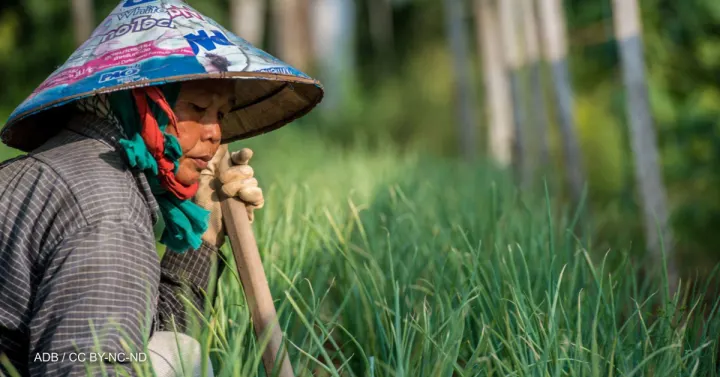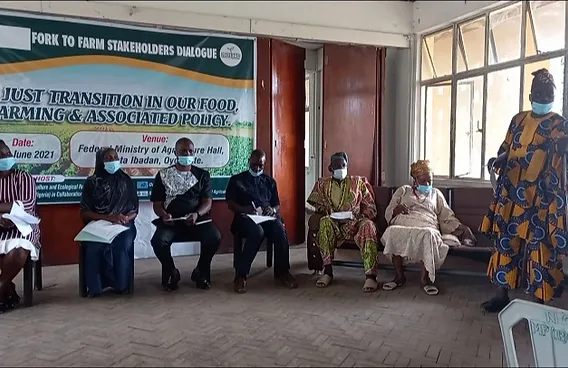His Excellency, President Bola H. Tinubu
The undersigned organisations are writing on behalf of the millions of Nigerian smallholders, environmental advocates, and civil society organisations, to express our deep concern regarding the recent Memorandum of Understanding (MoU) with the biggest meat processor globally, Brazilian meatpacker JBS, for a $2.5 billion investment in the country’s industrial food and livestock production systems, and calling to cancel the agreement.
Introduction
The MoU includes the construction of six poultry, cattle and pork factories, a move heralded as a step toward boosting the economy and addressing the country’s growing food needs. However, this deal represents a dangerous leap in the wrong direction, with far-reaching consequences. The partnership threatens to undermine Nigeria’s food sovereignty and perpetuate the ecological and social harm caused by industrialized farming. To protect the health of the nation and the well-being of its people, Nigeria must resist this industrial path and instead invest in a food system rooted in equity, sustainability, and the people’s rights to food sovereignty, which align with the right of people to healthy and culturally appropriate food produced through ecologically sound and sustainable methods, and their right to define their own food and agriculture systems.
Also, this move directly contradicts the “Declaration on Food and Emissions,” to which Nigeria is a signatory. The declaration urges the European Commission, OECD countries, and China to align the cost of food with its associated greenhouse gas (GHG) emissions, recognizing that livestock production is the leading source of GHG emissions contributing to climate change within the global food system.
A license to exploit
The industrial model of farming, fisheries, and livestock management, epitomized by companies like JBS, undermines the basic principle of food sovereignty—that communities should have control over their food systems. It commodifies food and animals, centralizes control, and prioritizes profits over people’s rights to healthy, culturally appropriate, and nutritious food. The consequences are far-reaching: environmental degradation, animal suffering, public health crises, and deepening inequalities.
Consider Nigeria’s growing reliance on industrial agriculture: just four multinational corporations control over two-thirds of global seed sales, pushing the widespread use of genetically modified (GM) seeds that marginalize local seed varieties. The influx of GMOs into Nigeria’s agricultural systems is increasingly displacing Indigenous food practices[1],[2],[3] a trend that could have dire consequences for both food sovereignty and health. This shift toward industrialized food production—especially in the meat and poultry sectors—exacerbates food insecurity rather than alleviating it. Despite producing large quantities of crops like maize, Nigeria remains a food-deficit nation, with millions facing hunger annually[4]. Industrialized agriculture has failed to meet the nutritional needs of the population and worsened the climate crisis.
We have witnessed the direct impact that industrial agriculture has had on smallholder farmers, the backbone of Nigeria’s agricultural sector[5],[6]. The Green Revolution, led by entities like the Bill and Melinda Gates Foundation through the Alliance for a Green Revolution in Africa (AGRA), has already demonstrated the failure of industrial agriculture to deliver on its promises. Despite billions in subsidies, smallholders remain impoverished, their livelihoods undermined by high input costs and reliance on chemical fertilizers and pesticides[7]. AGRA’s model has failed to alleviate food insecurity and instead entrenched corporate control over food systems, leaving smallholder farmers at the mercy of multinational agribusinesses.
Similarly, in the industrial animal agriculture sector, as seen in other developing countries, where the industrial animal production system is well entrenched, smallholder farmers have had no option but to sign contracts with multinational meat and dairy corporations, requiring heavy investments, leading them into debt and low levels of income[8]. All production risks are being passed onto farmers, making it challenging for them to live in dignity and earn a livable income. Nigeria seems poised to emulate this model in the animal agriculture sector through JBS, leading to these same devastating consequences.
A threat to public health, animal welfare, and climate
The industrial meat production that JBS promotes also contributes to a number of ecological and public health crises[9],[10]. Industrial livestock production drives significant environmental degradation through deforestation, soil depletion, and water contamination[11]. In addition to the environmental toll, the overuse of antibiotics in industrial meat production is creating a public health nightmare.
Nigeria, like many countries, is already facing the growing threat of antimicrobial resistance (AMR), a crisis fueled by the misuse of antibiotics in factory farming to speed their growth for profit and prevent animals from getting sick in the dismal conditions they are kept in. This misuse contributes to the spread of resistant bacteria, which threatens both livestock and human populations. A recent study found resistant bacteria in Nigerian livestock[12], highlighting the public health risks associated with industrial animal agriculture. Furthermore, factory farms are known to be significant sources of zoonotic diseases—diseases that can jump from animals to humans; a risk that will only increase with the expansion of industrial meat production.
This industrial animal agriculture model also exacerbates climate change, with the livestock sector responsible for a substantial portion of Nigeria’s greenhouse gas emissions[13]. The increase in land cleared for industrial feed production, such as maize and soybeans, only compounds this issue. It also leads to land grabbing, intensifies competition for land and other resources, further straining fragile systems already under pressure from climate change. This land, which could support pastoralists and small-scale farmers in growing food for human consumption, will instead be diverted to produce feed for animals in industrial farming systems.
Equitable, Humane and Sustainable food systems through agroecology offer truly sustainable solutions
The real solution to Nigeria’s food crisis lies not in the hands of corporations like JBS but in agroecology—a farming system that supports smallholder farmers, ensures food sovereignty, and promotes animal welfare and sustainable land and resource use. Agroecology emphasizes local food systems, ecological practices, and the empowerment of communities. By investing in agroecology, Nigeria could not only improve food security but also restore biodiversity, mitigate climate change, and foster greater resilience against future shocks. Agroecological practices have been shown to increase yields while reducing environmental damage, offering a true pathway to a sustainable food future for Nigeria[14].
The benefits of agroecology go beyond food production. It also provides opportunities for gender equity and social justice. In Nigeria, where 60-79% of the agricultural workforce is female but where land ownership remains overwhelmingly male-dominated, agroecology can be a powerful tool for empowering women and marginalized communities. By ensuring equitable access to land and resources, agroecology can provide women and youth with opportunities to contribute to sustainable food systems and break the cycle of poverty.
Plant-based proteins require far less land, water and energy to produce than conventional animal-based meat and dairy and, as such, can be a tool to address the environmental harms of the rising meat consumption by rapidly increasing the access and availability of equitable, humane and sustainable proteins.
Nigeria has a choice: to continue down the path of industrial food production, which promises short-term economic gains but at a great cost to public health, the environment, and food sovereignty, or to invest in a just transition to agroecology — a future where food systems are equitable, humane, and sustainable. The MoU with JBS is a stark reminder of the risks of prioritizing corporate profit over the health of citizens, the environment, and food sovereignty. The future of Nigeria’s food system should be determined by its people, not by foreign interests that have no stake in the country’s long-term well-being.
Nigeria must resist the allure of industrial agriculture, and instead embrace a food system where the right to food sovereignty is respected and puts peoples, animals and the environment at its heart, not multinational corporations. People Over Profits! We are therefore calling for the cancellation of the MoU, and focusing on a just food transition to drive an equitable, humane and sustainable food system through agroecology.
Endorsements
Youth in Agriculture and Restoration Network (YARN)
World Animal Protection
Environmental Rights Action/Friends of Earth Nigeria. (ERA/FoEN)
Health of Mother Earth Foundation (HOMEF)
Lagos State Catfish and Allied Farmers Association of Nigeria
Livestock for Social Good Foundation
Youths in Sustainable Dairy Network (YiSDN)
World Ecological Concepts
Abak Farms Enterprises
Relief International Africa
LATIA Farms / LATIA Global Investment Ltd
GMOs Free Alliance
The Young Environmental Network (TYEN)
Committee on Vital Environmental Resources (COVER)
HEDA Resource Institute
Alliance for Action on Pesticides in Nigeria (AANP)
Community Action for Food Network
Eat for Impact Initiative
ProVeg Nigeria
[1] Oguamanam, C. (2015). Organic Farming in Nigeria in the Era of Agro-Biotech and Biosafety. Environment for Innovation eJournal.
[2] Ademola (nee Olaniyan), S.A., Bakare, A.A., & Morenikeji, O.A. (2007). GENETICALLY MODIFIED FOODS IN NIGERIA: A long-lasting solution to hunger?
[3] Not on Our Plates: Nigeria does not need GM Food ; Publication of the Health of Mother Health Foundation: https://homef.org/wp-content/uploads/2018/09/4_Not-on-Our-Plates-copy.png
[4] Olugbire, O.O., Olorunfemi, S., & Titilope, O. (2021). CONTRIBUTION OF SMALL-SCALE FARMING AND LOCAL FOOD SUPPLY TO SUSTAINABLE PRODUCTION AND FOOD SECURITY IN NIGERIA – A REVIEW. Journal of Agribusiness and Rural Development, 59.
[5] Alufohai, G.O., & Oyoboh, D.E. (2013). Environmental Impacts of Commercial Agriculture in Nigeria: A Review.
[6] Obayelu, A.E. (2015). Transformation from Subsistence to Commercial Agriculture in Nigeria: The Effects of Large-Scale Land Acquisition on Smallholder Farmers.
[7] Sundaram, J.K. (2021). Another False Start: The Green Revolution Myths that Africa Bought.
[8] Marks, D. 2022. The Contract Farming Promotion and Development Act (2017) of Thailand: Origins and impacts to date. MRLG Thematic Study Series #12. Vientiane: MRLG.
[9] Segata, J., Beck, L., & Muccillo, L.M. (2021). Beyond Exotic Wet Markets: COVID-19 Ecologies in the Global Meat-Processing Industry in Brazil. eTropic: electronic journal of studies in the tropics, 20, 94-114.
[10] Coyle, C.W., & McKinstry, A. (2023). The Benefits and Burdens of Meat Consumption. Voices in Bioethics.
[11] Steinfeld, H., Opio, C.I., Chará, J., Davis, K.F., Tomlin, P.R., & Gunter, S.A. (2019). Overview paper : Livestock , Climate and Natural Resource Use.
[12] Ejikeugwu, C.P., Obum-Nnadi, C.N., Onu, E.N., Adonu, C., Ujam, N.T., Iroha, C.S., Nwakaeze, E., Udu-ibiam, O.E., Afiukwa, N., Ugwu, M.C., Iroha, I.R., & Adikwu, M.U. (2022). Livestock and Poultry Milieus as Non-Hospital Sources of AmpC and ESBL Producers in Southeast Nigeria. International Journal of Pharmaceutical And Phytopharmacological Research.
[13] Dioha, M.O., & Kumar, A. (2019). Exploring greenhouse gas mitigation strategies for agriculture in Africa: The case of Nigeria. Ambio, 49, 1549-1566.
[14] Onyeneke, C., Ume, C.O., Amaechina, E.C., Chukwuma Ume, N.N., Onah, O.G., Obetta, A., & Omeje, E.E. (2024). Food self-provisioning: Implications for sustainable agroecological transition in rural Nigeria. Heliyon, 10.



